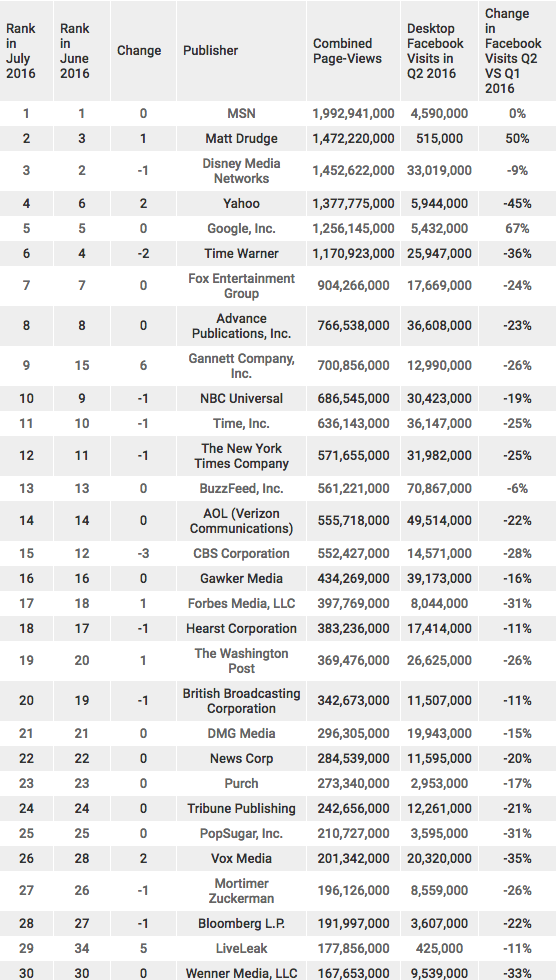Media
Facebook Traffic Is Plummeting, and 5 Other Takeaways From SimilarWeb’s Publisher Rankings
What’s the biggest digital news outlet you can think of? The New York Times? BuzzFeed? Fox? Nope. It’s MSN.
According to SimilarWeb’s rankings of July’s most popular U.S. publishers, MSN came out on top, with nearly 2 trillion combined pageviews. What’s striking is that only 4.5 million of those pageviews came from Facebook. Well, until you remember that MSN.com is the default homepage for Internet Explorer. Whenever someone opens a new window or tab on Internet Explorer, which still has surprisingly strong market share, MSN gets a pageview.
Here are six more interesting takeaways from the rankings, besides the sheer number of people who haven’t downloaded a better browser yet.
1. The Drudge Report is unstoppable
The Drudge Report was the second most popular publisher in July, followed by its right-wing brethren Fox News, Breitbart, and the Blaze in sixth, 26th, and 60th place, respectively. Young Conservatives, meanwhile, experienced the biggest jump of any publication on the list, moving from 250th place to 145th.
Will the fact that Matt Drudge had almost 900 million more pageviews last month than the comparatively liberal New York Times have any bearing on the presidential election? Hard to say. Regardless, it’s easy to make the connection that Donald Trump and the upcoming election has helped traffic spike.
2. Google’s a publisher?
Taking the bronze is Google News. Despite not actually publishing any news, Google was America’s third most popular publisher in July. Good for Google, it really needed the traffic.
3. The Facebook plummet
Facebook traffic dropped for an overwhelming majority of the top 300 media publications (besides Google, which had a 67 percent increase in Facebook visits from Q1 to Q2). Among the 252 outlets that saw losses, Facebook traffic dropped an average of 28 percent. The median dip was 26 percent.
Just look at all those double-digit dropoffs:

4. The benefit of buying Gawker
Univision, which owns sites like The Onion and Fusion, came in as the 69th biggest U.S. media company, which isn’t all that impressive. But its recent purchase of Gawker Media for $135 million could change that, since Gawker was the 16th most popular publisher.[note]This includes all Gawker Media properties, like Deadspin, Jezebel, and Gizmodo, not just Gawker.com.[/note]
It’ll be interesting to see how the move affects Fusion, Univision’s site for millennials that, in 297th place, barely cracked the list of individual sites. Will the Gawker presence render it obsolete? Or will Univision be able to cross-promote content and pull Fusion up the rankings?
5. In defense of acquiring Yahoo
As a business, Yahoo has struggled over the years. But as a publisher, its homepage had the fourth-most pageviews in July of any U.S. publisher. Verizon, which bought Yahoo for $4.8 billion in July, hasn’t fared well in the digital content publishing space before with efforts like Sugarstring and Go90. Maybe Yahoo is Verizon’s chance to finally be relevant (and spread its anti-net-neutrality message to a wider audience.)
6. Utah loves local news
Local news outlets were much higher than I expected. KSL.com, a local news site serving Salt Lake City, was ranked 23rd. SFGate.com followed close behind in 27th. Both are ranked higher than every Gawker site, and even national outlets like NPR. Publisher Advance Digital’s local sites for New Jersey, Alabama, Cleveland, Michigan, New Orleans, Oregon, Pennsylvania, and Syracuse also made the top 300.
The popularity of local sites, along with the rise of partisan publishers, seems to point to the continued fracturing of the American news media. That these local and ideologically led sites rival or even surpass the traditional publications of record suggests that Americans no longer want all the news that’s fit to print. Perhaps all they want is to see what directly affects them.
Image by GettyGet better at your job right now.
Read our monthly newsletter to master content marketing. It’s made for marketers, creators, and everyone in between.




